Figuring out how much a service provider should be charging isn’t always straight forward. Especially when it comes to assessing the value and cost of a marketing consultant
Cost and value, though many would have you believe are aligned, often couldn’t be more different.
High cost doesn’t necessarily mean high value, but there is something to be said for getting what you pay for.
Striking the right balance between cost of a marketing consultant and their value involves many different factors. For instance, you must carefully consider a their justification for their prices, what you are expecting them to do and what you expect the end result to be.
How many years of experience do they have? How relevant is their experience? What’s their reputation like? What are they doing for you? Where are they located and how do their prices compare to their competitors? The answers to these questions will help you determine whether a marketing consultant is pricing themselves fairly and reasonably, or otherwise.
In this chapter, we will give you some ballpark figures for how much marketing consultants might charge and reveal what you should expect from these different price ranges. We will also discuss the different pricing models, as well as their comparative advantages and disadvantages.
Ballpark Figures For Marketing Consultant Prices & What To Expect
 Assuming the marketing consultants you are considering use a per day pricing model (which is reasonably common) here is an idea of what you should expect from the following price ranges:
Assuming the marketing consultants you are considering use a per day pricing model (which is reasonably common) here is an idea of what you should expect from the following price ranges:
£150 to £250 per day
For this amount, you should expect a recent graduate with at least a year of experience. This type of marketing consultant is better suited to the daily grind and specific tasks than marketing strategy.
You might expect them to update your website, proofread your blog content, and perform other basic tasks of this nature.
£300 to £450 per day
Marketing consultants or consultancies that charge these prices are typically project managers and action planners, usually with a marketing head.
They should have at least five years of experience and proven experience of creating integrated execution strategies..
£500 to £1,500 per day
Marketing consultants and consultancies charging upwards of £500 per day should have more than a decade of experience, a reputation for success, and a history of working with some notable brands.
They will also have worked with clients with significant marketing budgets in the past, demonstrating their ability to manage large-scale campaigns.
Please note, however, that total time working is not always an indicator of quality, but it does mean that they have had skin in the game. As a general rule, the more successful the campaigns or well-known the person is, the higher you would expect them to cost.
Pricing Models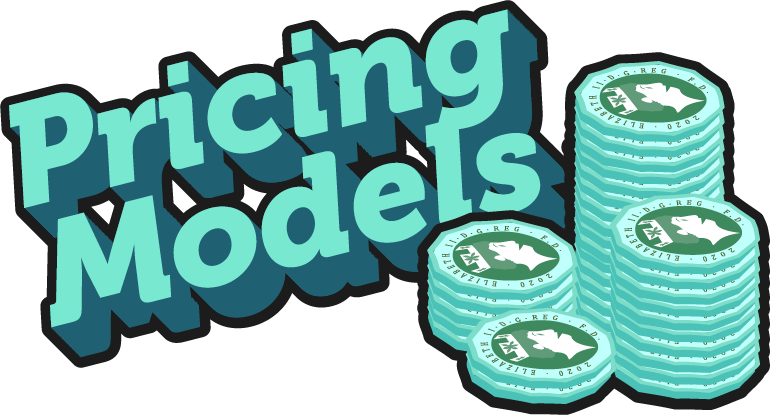
There are also other pricing models to consider besides the day rate pricing model. Some marketing consultants or marketing consultancies will, for example, charge by the hour or by the project.
Consider these options carefully before making your decision, as some may sound cheaper at face value but turn out to be significantly more expensive in the long term.
For example, the hourly rate model can quickly spiral out of control unless you have established clear expectations and limits with your marketing consultant.
If they ever plan to put in more hours than they initially communicated to you, you should be given reasonable notice of this and should expect to be told why the project is taking longer than expected.
You should also pay attention to any suggestions of retainers or contracts. Are you enlisting the marketing consultant’s services on a month to month basis, or are you contracted to stay with them for a full year?
It is important to ask these questions, ensure that any contract clauses are clear, and that exit terms are fair and transparent. Below are some of the pricing models you can expect to see in your search for the right marketing consultant.
Time and Resource-Based Models
Time and resource-based pricing models usually leverage a fixed day rate or hourly rate to calculate how much you will be charged.
 With this type of model, you should expect to be charged for the exact amount of time worked, in addition to any material expenses. There are a number of pros and cons to time and resource-based models, which have been outlined below.
With this type of model, you should expect to be charged for the exact amount of time worked, in addition to any material expenses. There are a number of pros and cons to time and resource-based models, which have been outlined below.
Pros
- It is easier to confirm value, because you can interrogate how long has been spent on each task
- Pricing is clear and logical
Cons
- Trust is essential, because a consultant could mislead you regarding how much time has gone into a task
- This model gives your consultant an excuse to work slowly
- If there are any delays or mistakes made, you could end up paying for them
The time and resource-based models are usually suited to project-based work, rather than service-based work.
Fixed Fee Model
The fixed fee model is a popular alternative to variable time-based models. If your marketing consultant leverages this model, you should expect to be charged a pre-agreed upon fixed fee for your project—no more and no less.
For example, if you have asked your marketing consultant to create content for your website, they would give you a price for delivering the full project to completion.
There are two types of fixed fee pricing models: cost plus and value-based. There are some key differences between these two models, and each has a unique set of advantages and disadvantages.
The marketing consultant or marketing consultancy you work with may not be transparent about which of these models they use to calculate your fixed fee, so be sure to ask outright if you feel that the answer could inform your decision.
Cost Plus Fixed Fee
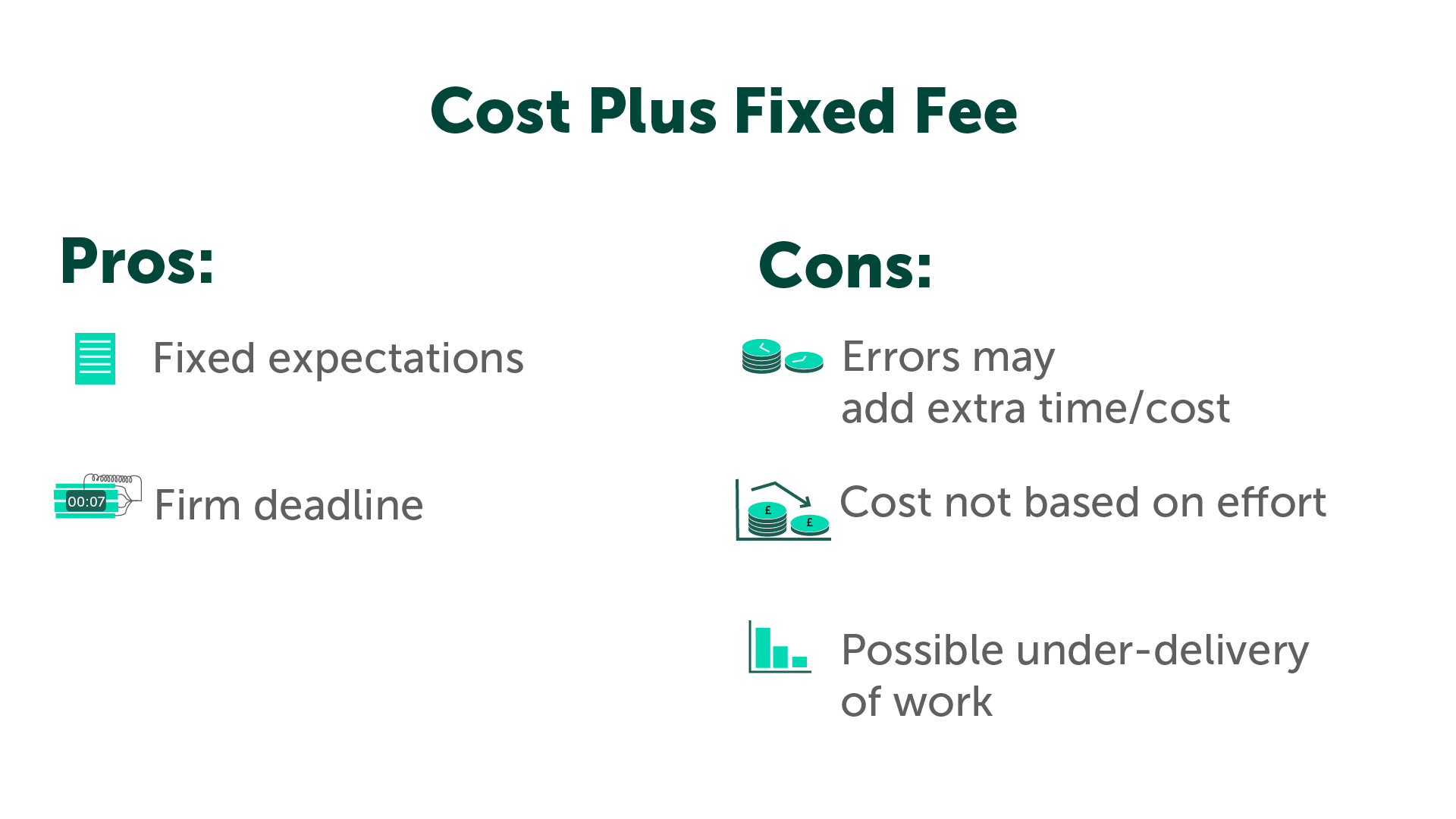 This is the most common type of fixed fee model. It involves the marketing consultant estimating, as accurately as they can, how long the project will take them to complete and how much effort will be required. They then apply their markup and quote you for a fixed fee.
This is the most common type of fixed fee model. It involves the marketing consultant estimating, as accurately as they can, how long the project will take them to complete and how much effort will be required. They then apply their markup and quote you for a fixed fee.
Pros
- You will know exactly what to expect in terms of costs
- You will usually have a firm deadline, so you are aware of when to expect project completion
Cons
- If something goes wrong or the consultant has miscalculated the effort and resources required, they may ask you to pay more and this could cause disagreements
- Cost is not determined by effort, which means the consultant has less incentive to deliver their best work
- You can’t be certain that their time estimates are fair and they may overestimate to bump up the price
Value-Based Fixed Fee
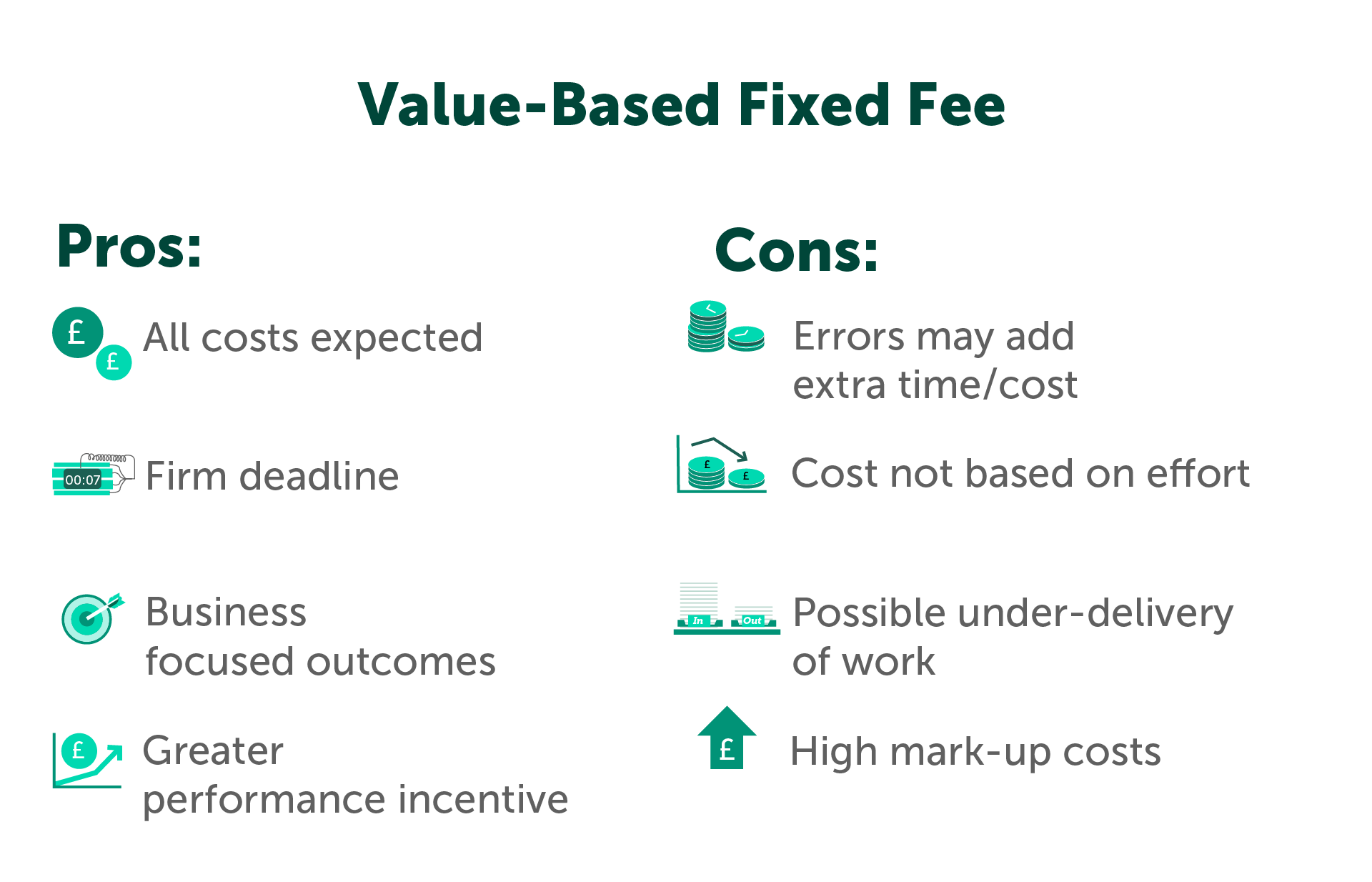 Value-based fixed fee models involve applying a profit margin based on how valuable the engagement and deliverables is to the client. Effectively, a marketing consultant using this model determines their price by how much value the solution provides and provides a fixed fee quote based on this.
Value-based fixed fee models involve applying a profit margin based on how valuable the engagement and deliverables is to the client. Effectively, a marketing consultant using this model determines their price by how much value the solution provides and provides a fixed fee quote based on this.
Pros
- You will know exactly what to expect in terms of costs
- You will usually have a firm deadline, so you are aware of when to expect project completion
- Greater focus on business outcomes
- May provide a greater performance incentive
Cons
- If something goes wrong or the consultant has miscalculated the effort and resources required, they may ask you to pay more and this could cause disagreements
- Cost is not determined by effort, which means the consultant has less incentive to deliver their best work
- You can’t be certain that their time estimates are fair and they may overestimate to bump up the price
- Value-based pricing often incurs a higher markup than cost plus pricing
Like the time and resource-based models, the fixed fee model (both cost plus and value-based) is better suited to project-based work than service-based work.
Risk/Reward Model
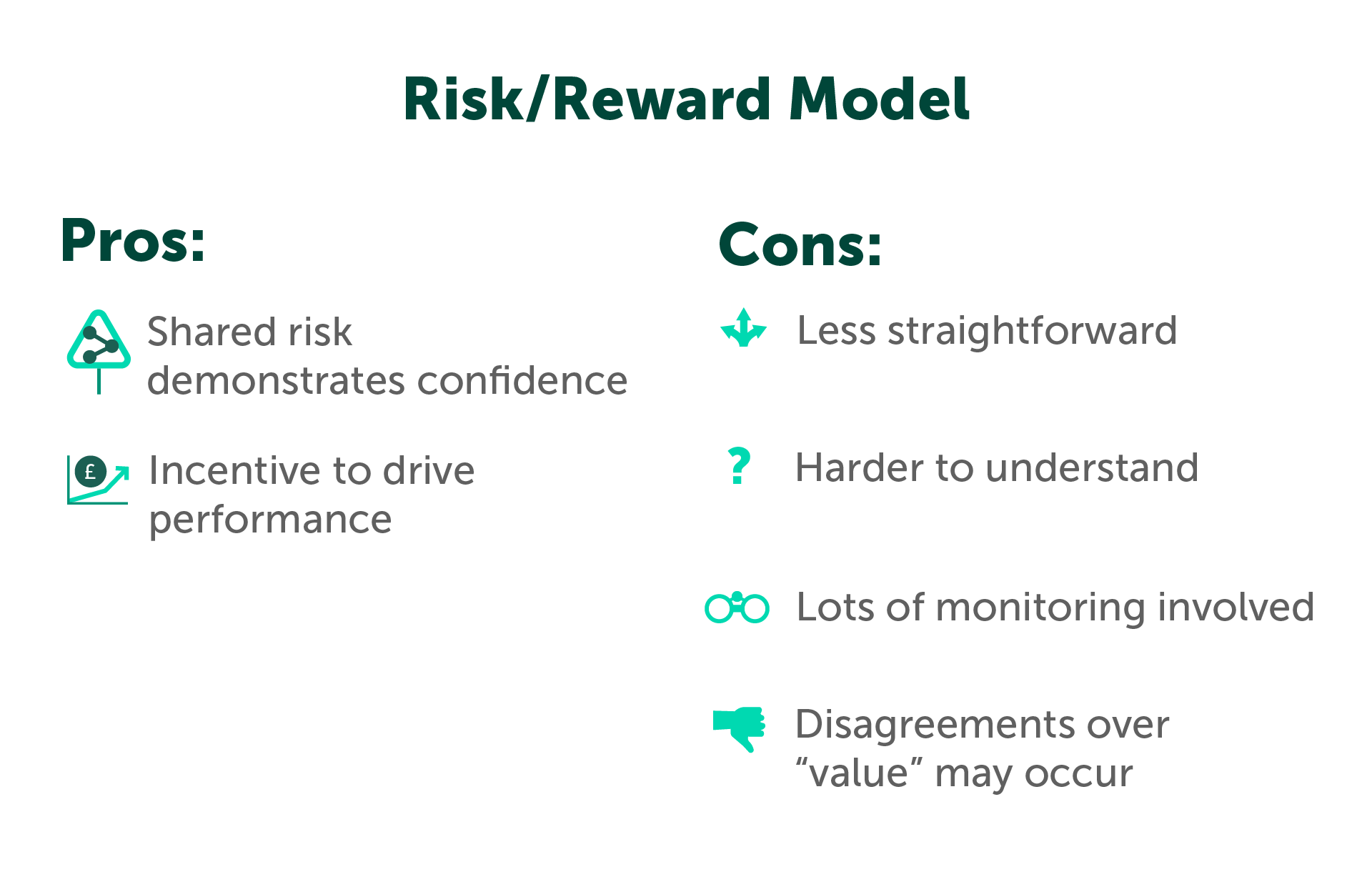 With the risk/reward pricing model, you agree to pay a base fee, in addition to a risk/reward fee that should be aligned with the outcomes of the campaign or project.
With the risk/reward pricing model, you agree to pay a base fee, in addition to a risk/reward fee that should be aligned with the outcomes of the campaign or project.
The risk/reward element of the fee can either be variable or fixed and is likely to be based on time, scope, cost, risk, benefits, quality, or a combination.
Most consultancies don’t apply the risk/reward model, although there are a lot of benefits for you as the client.
Pros
- This model demonstrates confidence and is usually evidence of “skin in the game” because risk is shared with the client
- A great incentive for your marketing consultant or consultancy to drive performance
Cons
- Less straightforward than other models
- Most businesses won’t fully understand the risk/reward model and its implications
- Requires robust monitoring and measurement processes
- It is possible that you may disagree with your consultant regarding the value of what has been delivered
Retainer Model
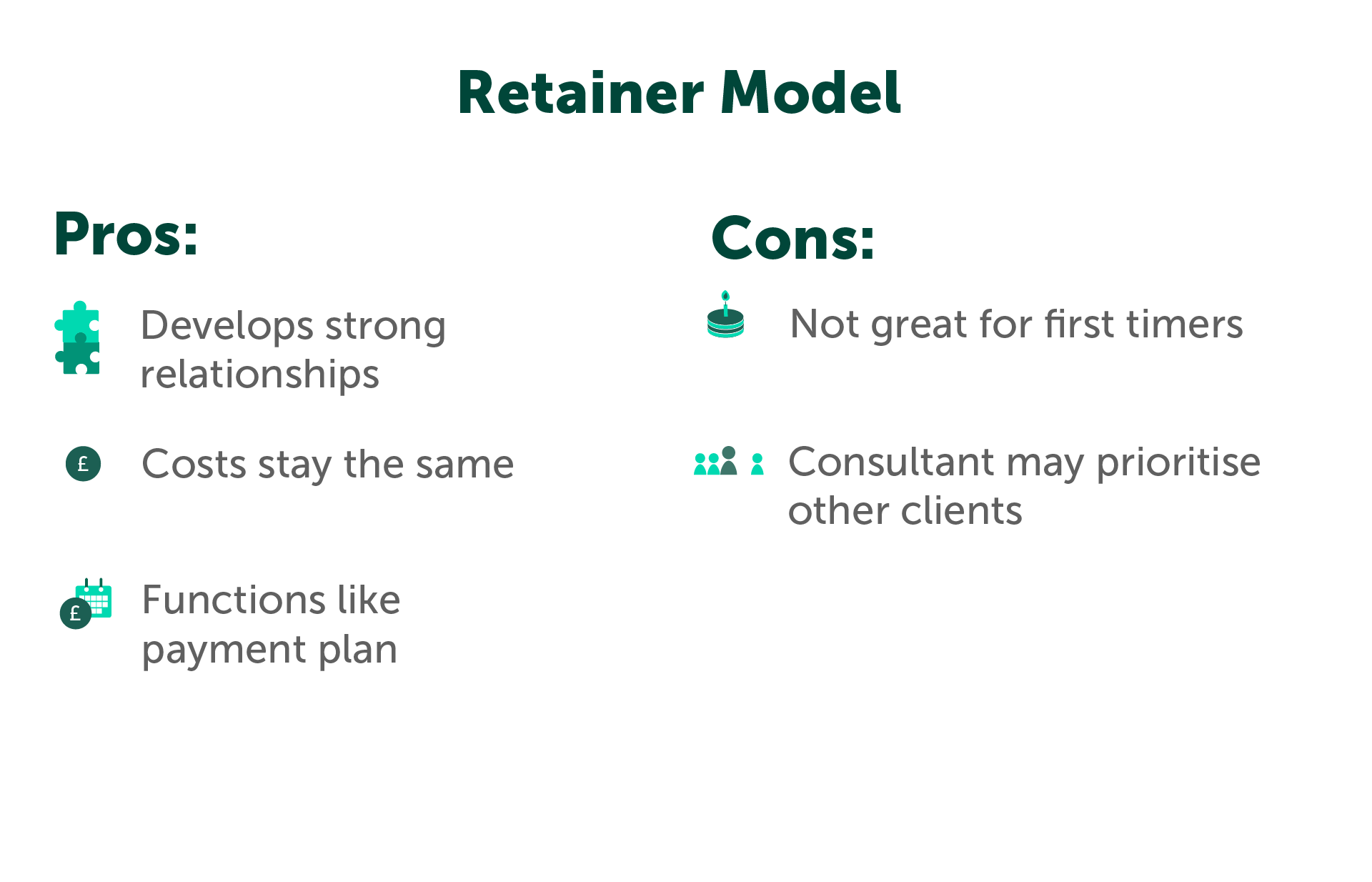 Lastly, we have the retainer model. This involves paying a recurring fee (often monthly) to retain a marketing consultant’s services. For example, you might pay £2,000 per month for 15 hours of input from your marketing consultant. The retainer model is usually used when the nature of the work you require is recurring.
Lastly, we have the retainer model. This involves paying a recurring fee (often monthly) to retain a marketing consultant’s services. For example, you might pay £2,000 per month for 15 hours of input from your marketing consultant. The retainer model is usually used when the nature of the work you require is recurring.
Pros
- Ongoing work and communication develops a strong relationship with your consultant
- You are always aware of the costs and have plenty of time to prepare for paying the invoice
- Often functions like a payment plan, splitting the cost of longer projects over the course of several months
Cons
- Not ideal for a first project with a marketing consultant
- A marketing consultant could become complacent over time or prioritise other clients
Which Model Is Right For You?
There is no “right” answer to this question. The model that is right for you will depend on how you prefer to maintain relationships with service providers, your budget, your cash flow, the nature of the work you need completed, and how trustworthy you believe your chosen marketing consultant is.
In our experience, the model that works best for each client is largely a matter of preference—and you may not get it right the first time around.
You might think you’d value the consistency of a retainer model, but find that you prefer the seemingly more direct relationship between cost and value associated with an hourly or day rate model.
It is also worth noting that the pricing model isn’t the be all and end all of choosing a great marketing consultant. If you stumble across a marketing consultant who really wows you, don’t let their pricing model get in the way. The key point is always keeping the end goal in mind; if you think that they can get you there, then great.
We would recommend testing their ability by giving them a small, low-risk project. If they meet expectations, balancing cost and value effectively, the type of pricing model they are using will feel increasingly irrelevant.
